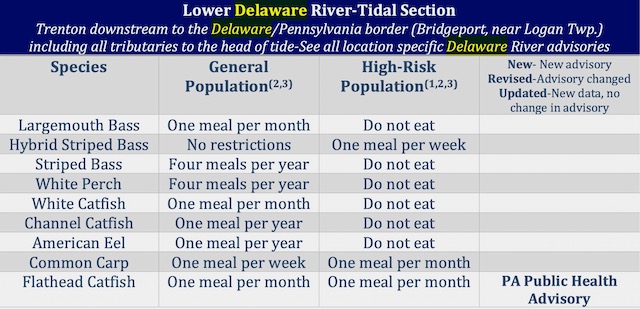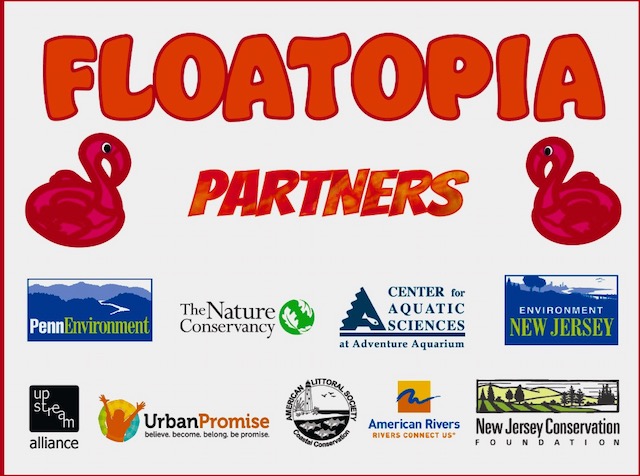Delaware River “Activists” and NJ Spotlight Mislead Readers On Risks Of Eating Fish
While Stunt Celebrates Self Serving Federal Funding, It Ignores Regulatory Reality
This is all part of a broad toxification of the environmental movement, which has taken a regressive turn toward collaboration with big business, wealthy donors and corporate-backed foundations. Green groups that embrace market-based initiatives, rather than stand up for sensible regulation and strict enforcement of environmental laws, are the ones that get lavish funding. ~~~ Christopher Ketcham, The Daily Beast
[Update below]
It’s hard to know where to begin to respond to today’s NJ Spotlight story on the Delaware River “Floatopia” event, see:
But let me begin by making it absolutely clear that I support political stunts. They can be great tactics to draw attention to problems and solutions, organize and expand the number of activists, and hold polluters and government regulators accountable.
But to be effective in making positive change, they need to focus on and leverage policy reality by targeting the sources of power and decision-making and making specific demands. They must avoid being an outlet for individual self expression, mis-focused attention, diversion that provides political cover, and grifting.
Unfortunately, the Delaware River “Floatopia” falls into the later category.
1. Here’s the misinformation:
Worse, it irresponsibly even generated misinformation about the safety of eating fish from the river:
Lion James, a fisherman and supporter of river-advocacy groups including Upstream Alliance, said he regularly eats catfish he catches in the river, and wants to spread the word that the river is a lot cleaner than it once was.
“It’s definitely clearer, there’s way less debris than I’ve seen in this water in the past,” said James, while fishing from his kayak away from the main Floatopia raft. “It doesn’t smell, and there’s less trash in the park. As an outdoorsman and a water sports enthusiast, you notice when a waterway is cleaner than it was before. You can always use this water as a metaphor for your backyard, so treat it like you would your own property.”
Still, he limits his consumption of freshwater fish because of lingering concerns about mercury. “This water has been cleaned up quite a bit so that eating the fish out of here, in moderation, it’s fine,” he said.
No, it is definitely not “fine” to “eat fish in moderation”. (see table above)
And the chemicals of concern and risks are not limited to “mercury”. (see below)
Not mentioned in the Spotlight story, here are the most recent (2021) NJ DEP fish consumption advisories (the table above for the lower Delaware is found on page 17):
However, certain fish may contain contaminants, such as polychlorinated biphenyls (PCBs), dioxins, mercury, and other contaminants from the water they live in and the food they eat. Contaminants such as dioxin and PCBs are classified by the U.S. Environmental Protection Agency as probable cancer-causing substances in humans. Elevated levels of mercury can pose health risks to the human nervous system, particularly to developing fetuses. Therefore, it is a good idea to follow a few precautions in consuming recreationally caught fish and crabs, particularly if you eat them often.
The DEP advisories ignore hundreds of other chemicals, including unregulated toxic chemicals and endocrine disruptors. So, the real public health risks are even worse than DEP warns.
[Update: a reader expands:
There is a flaw on fish advisorys they use 1 in 100,000 cancer risk and not 1 in a Million. ~~]
[CORRECTION: Just checked. It’s even worse than our reader noted – see page 4, individual cancer risk level is 1 in 10,000! That’s 100 times higher than the Legislative cancer risk standard of 1 in a million for drinking water:
This means that one additional cancer may occur in 10,000 people eating fish at the advisory level for a lifetime.
Of course, ignoring these toxic risks let’s industrial and sewer plant polluters and DEP regulators off the hook.
There are also bacteria public health issues – portions of the river fail to meet water quality standards for direct contact recreation – that are misrepresented, which not only fails to warn the public but invites unsafe swimming:
“It’s important for our community to understand what a great resource this is,” said Camden Mayor Victor Carstarphen, in a shoreline interview. “Not a lot of folks know that you can swim here at certain times of the year.”
So, misinformation also diverts attention from real problems and real solutions.
2. Here’s the political cover:
Baugh said some of the federal money that’s newly available for improvements in infrastructure and pandemic relief should be used to fix or replace the combined sewer overflows, which continue to overflow into waterways and even streets in communities including Camden and Philadelphia. (NJ Spotlight)
Yes, CSO’s are a major problem. But, in addition to “federal money”, there is federal EPA and State DEP regulatory power that goes unmentioned.
So, what are DEP regulators doing about that with their regulatory powers? They are weakening clean water standards and issuing toothless CSO permits!
It is revealing that there is no Foundation or government funded events and activism on those issues. That fact tells you all you really need to know.
Mr. Baugh is well meaning (although it appears he runs an organization that relies on Baugh family nepotism), but he doesn’t seem to know anything about regulations, like the toothless DEP CSO permits and a recent DEP “variance” proposal that would create a new giant loophole in clean water standards that apply to the Delaware River, thus letting polluters off the hook.
All these Foundation and government funded astro-turfed stunts and events and campaigns and even organizations are actually serving the interests of corporate polluters and providing cover and protecting political officials and regulators.
3. And here’s the grift:
“For the last 12 months there has been a flood of federal dollars flowing to the states that we think should be available to help solve some of these problems,” said Don Baugh, president of Upstream Alliance, a nonprofit that organizes the event. “There’s never been more federal monies available; we’ve never had an opportunity like this before.”
The “partners” for this project are beneficiaries of huge federal funds and Foundation grants –
Wm. Penn Foundation alone has invested $100 million in the Delaware River watershed.
They promote non-regulatory, voluntary, local, and market based initiatives: (Delaware River watershed)
The DRWI was designed and launched in the absence of any state or federally mandated watershed-wide requirement for restoration or protection of water quality. It is an NGO-led watershed protection program driven by the cumulative effort, strategic thinking, and vision of over 50 organizations…
And they openly acknowledge the top down Foundation money driven astro-turf nature of that initiative and its limited focus to non-point pollution (intentionally letting regulators and major corporate “point source” polluters off the hook) Delaware River watershed:
While the DRWI was conceived and designed in partnership with others as a William Penn Foundation grantmaking strategy, our hope is that, through the process of building and refining the Initiative with the input of dozens of participants and stakeholders, there is a framework of relationships and practice that will endure beyond our grantmaking that can methodically address nonpoint source pollution over time.
These groups lobby for federal funding for themselves:
36 Delaware Watershed Conservation Fund awards totaling $14 million, which includes $4.9 million in funds made available through the Bipartisan Infrastructure Law.
Of the 36 new or continuing conservation and restoration projects, thirteen will be completed by nine members of Coalition for the Delaware River Watershed.
All these groups focus on is the money.
And the Mayor of Camden agrees: (NJ Spotlight)
“It’s important for our community to understand what a great resource this is,” said Camden Mayor Victor Carstarphen, in a shoreline interview. “Not a lot of folks know that you can swim here at certain times of the year. One of my jobs is to get more funding for cleaning up our waterways so that all the time, the river can be a resource for our community.”
I want to make it clear that there’s no problem in seeking funding for cleaning up waterways – take a look at the correct way to do so, by integrating infrastructure funding with the regulatory implementation of the Clean Water Act.
But when those efforts are done in a way that intentionally ignores major problems; ignores regulatory solutions; diverts public, activist, and media attention; misinforms the public; and funds ineffective voluntary solutions and non-profit grifters; then there is.
End Notes:
1. I don’t know if Dupont still funds organizations not to work on issues involving the toxic messes they’ve created: see the Orwellian named “Clear Into The Future”
The world’s largest toxic corporate polluter, Dupont, also funds a Delaware Estuary program – with the Orwellian title “Clear Into The Future” – and a group mentioned in the NJ Spotlightcoverage. Of course, Dupont does not fund science and regulation to hold them accountable for the toxic pollution of the river and bay.
2. These groups don’t do real local organizing and regulatory work, but they like to play the EJ card, see:
3. Here’s another example of where elite Foundation funding, corporate interests, and “green” groups form a coalition that effectively promotes privatization and subsidies, while ignoring regulation and marginalizing critics and activists:
[Update: 9/2/22 – A fine and relevant excerpt from Jeffrey St. Clair’s column today:
a march or a demonstration of popular feeling amounts to “little more than an orgy of democratic emotion, an activist-themed street fair, a real-world analogue to Twitter hashtag campaigns: something that gives you a nice feeling, says you belong in a certain group, and is completely divorced from actual legislation and governance.” In other words, the public sphere, where politics is performed, has been largely emptied of content in terms of the exercise of power: as with fiction, it has become a forum for secular testimony, a baring-of-the-soul in the world-as-church. Politics as thus practiced is primarily an exercise in personal expressiveness.” (Amitav Ghosh, The Great Derangement: Climate Change and the Unthinkable)




Pingback: WolfeNotes.com » Pinelands Endocrine Disruptor Study Is A Whitewash
Pingback: WolfeNotes.com » Advocacy For The Protection Of The Delaware Watershed Has Been Bought By The Wm. Penn Foundation